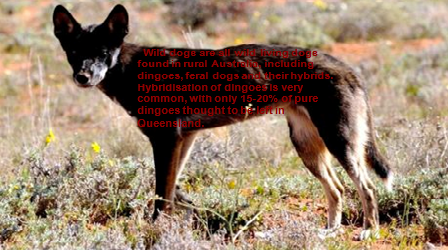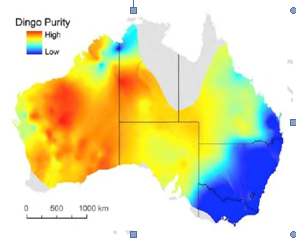
A Dog Act
AFTER 90 years living and working sheep on the land the Finlay’s are selling up, and wild dogs are cashing in on their losses.
Their Cooinda homestead’s award winning garden is well known in Queensland’s Southern Downs. Like a modern day Garden of Eden, it appears like a mirage out of the drought stricken landscape, a lush patch of green in a country renowned for its rocky terrain.
Created by newlywed Margaret Finlay in the 1950s, the garden became a haven for her and her husband Scott; a place to escape the stress and hardships that go hand in hand with farming.
But it’s not the frequent droughts that threaten the future of this beautiful oasis, nor the torrential rains and relentless heat. A new threat lurks on the fringes, stalking Cooinda with the same cunning and lack of mercy it shows its prey.
Wild dogs are considered a serious problem across Australia, with substantial adverse environmental, economic and social impacts on ecosystems, communities and individuals.
They pose a significant economic threat to the Queensland rural producers in particular, with industry organisation AgForce estimating wild dogs cost the grazing industry $67 million in 2008/09.
Since early 2008, the Finlay family have lost more than 950 sheep to wild dogs, a predator that had previously never existed in such numbers in the area. Scott estimates he has lost nearly $50,000 worth of sheep to wild dogs, and almost that same amount has been spent on fencing supplies in an a last ditch effort to control this crippling problem.
“Its absolutely devastating” says Scott Finlay. “We went from only losing a handful of sheep to dogs in the 70’s and 80’s to losing 15-percent of my entire flock in just five years.
“They are bloody hard to track, and even harder to kill. These dogs aren’t like other predators, they don’t kill to survive, they kill for sport, which makes it harder to see.”
Cooinda’s troubles began in 2008, when a pack of wild dogs established itself in the Southern Downs.
These malicious killers have forced Scott and Margaret to put Cooinda up for sale, and along with it, their precious garden.
Scott and Margaret say financial losses were not the only factor in their decision to sell.
The dogs have destroyed the refuge Margret created 40 years when her children left, and damaged their spirits.
“Scott and I no longer find it the haven it used to be for us. I love arriving home to my little patch of green amongst the dirt and rocks.”
“Yes, it’s absolutely devastating to just have to drive away after 50 years, of course it is. I’ve only just got the garden to where I want it, but Scotts ready to go, the strain is really affecting him.”
Dingo 2
MONGRELS: Dingo hybrids are a major issue.
The strain is evident in Mr Finlay’s face as he talks about the often confronting and relentless problems caused by wild dogs.
“I used to love going out for a drive around the property. This country is a special part of the world. Now after all the time spent driving around searching for killed or maimed sheep and then finding them dying slowly; its hugely confronting. I’m at the stage where I don’t want to go look to see what I might find.
“Economically it was affecting my business, and emotionally it was affecting me much more. I’ve lost my want to farm, to be a farmer.”
“Selling up is the last resort. It’s come to this.”
National Wild Dog Facilitator Greg Mifsud says the emotional toll is the main reason farmers are changing their enterprises or selling up.
“They can no longer deal with the stress of trying to prevent attacks on their livestock. There is a lot of pride in raising and breeding sheep in lines through the years, and it tips people over the edge.”
It appears the financial impact has almost become secondary to the psychological for many farmers. Studies conducted by The Australian Bureau of Agricultural and Resource Economics and Sciences (ABARES) highlight the psychological effects on landholders who had experienced ongoing attacks on their livestock by wild dogs, and found that 70-percent of those surveyed suffered similar trauma levels as those seen in people who had experienced motor vehicle accidents or other life threatening events.
The Southern Downs isn’t the only area in Queensland affected either. Michael Welsh, the Landmark Wool Manager for Queensland says he sees stories like this occurring all over the state.
“Every single property I can think of in Queensland that I deal with is impacted in some way.
“Even I have felt it, I have sheep too. It’s psychologically horrendous, I’ve come to the point of crying. I see this happening right across the district and see it in the anguish on people’s faces.”
Annually, wild dogs are costing the Queensland sheep and goat industry around $16.9 million, with an additional $2.5 million in associated management costs. Farmers believe it to be far higher than that, as personal financial losses can be enormous. Mr Welsh says this is due to hidden costs most people don’t see.
“When you think of the cost wild dogs have, you have to think bigger than the price of the sheep itself, about $50-$60. You have lost the initial worth of the sheep, then you have lost the cost of selling it. You have also lost the income off the wool, about $50 a year.
“Then you have to replace it, so thats another $50-$60. Once you factor in the cost of control measures.. and the farmers time, about $160 a day to the producers that people cant see; its quite substantial.
“Growers are crying out for leadership.”
With more dogs moving through a landscape where previously it has been controlled, farmers nation wide have been warned to expect attacks. The new release of The Wild Dog Action Plan by Wool Producers Australia may just be the solution that these farmers are so desperately seeking.
Unfortunately it comes too late for some.
While Margaret starts collecting plant cuttings from the Cooinda garden to take to her next home, Scott begins to pack up the machinery shed. A momentous task, sifting through 50 years of accumulated tools and memories but he remains positive about the future. Hopefully a young couple will buy Cooinda with energy to tend the garden and take up the fight to rid their new home of wild dogs forever.

